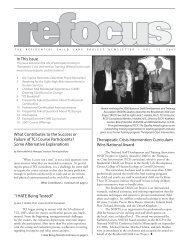The Therapeutic Crisis Intervention System - Residential Child Care ...
The Therapeutic Crisis Intervention System - Residential Child Care ...
The Therapeutic Crisis Intervention System - Residential Child Care ...
Create successful ePaper yourself
Turn your PDF publications into a flip-book with our unique Google optimized e-Paper software.
against abusive practices. Leadership should<br />
promote an organizational culture that values<br />
developmentally appropriate interventions<br />
and therapeutic practice above control and<br />
expediency.<br />
2. Clinical oversight: Clinical services play an<br />
important role in overseeing and monitoring<br />
clients’ responses to crisis situations. Developing<br />
and implementing an individual crisis<br />
management plan is critical to responding<br />
appropriately and therapeutically to each child in<br />
crisis.<br />
3. Supervision: Frequent and ongoing<br />
supportive supervision should be built into<br />
the implementation and ongoing monitoring<br />
of the crisis management system. Supervisors<br />
should be fully trained in all of the prevention,<br />
de-escalation, and intervention techniques so that<br />
they can provide effective supervision, coaching,<br />
and monitoring. A post-crisis multilevel response<br />
should be built into the practice. <strong>The</strong> child and<br />
staff member should receive immediate support<br />
and debriefing following a crisis. Discussing<br />
crisis incidents should be built into team/unit<br />
meetings so that all staff members can learn from<br />
these situations.<br />
4. Training: <strong>Crisis</strong> prevention and management<br />
training should be one part of a comprehensive<br />
staff development program that provides core<br />
training as well as specialized training based on<br />
the population served. Refreshers should be<br />
conducted with all direct care staff members as<br />
recommended and required. At the completion<br />
of the original training and refresher training,<br />
staff members can be expected to perform the<br />
skills at an acceptable standard of performance.<br />
This performance should be documented and<br />
the staff should be held to a certain competency<br />
level of performance in order to use high-risk<br />
interventions. Trainers should be required to<br />
attend refreshers in order to maintain their<br />
training status.<br />
Research Foundations of TCI<br />
5. Documentation and critical incident<br />
monitoring: Documentation is critical,<br />
and includes the documentation of<br />
staff supervision and training, and the<br />
documentation and monitoring of critical<br />
incidents throughout the agency. This<br />
documentation and monitoring system<br />
allows the organization to review incidents<br />
and make decisions about individual and<br />
organizational practice.<br />
THERAPEUTIC CRISIS INTERVENTION SYSTEM: <strong>Residential</strong> <strong>Child</strong> <strong>Care</strong> Project, Cornell University 15



